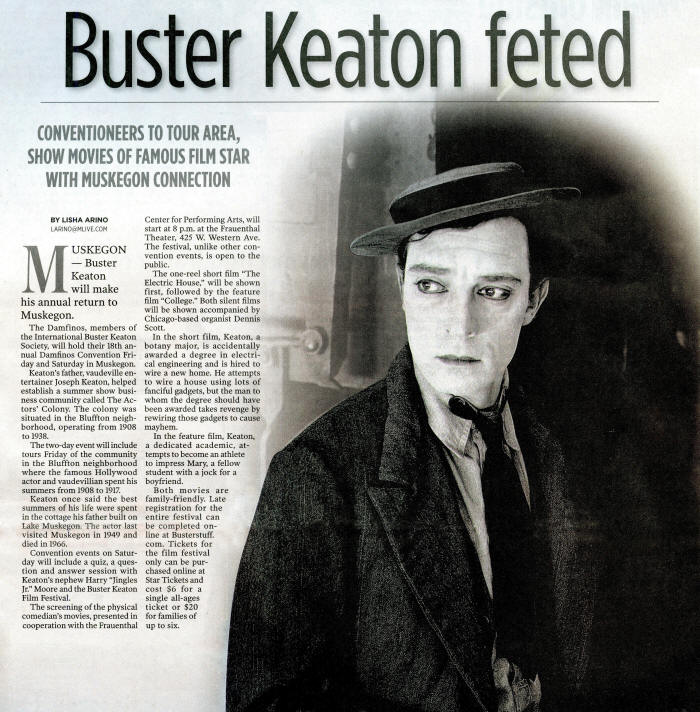Buster Keaton's 'favorite place on Earth' --
Muskegon -- hosts film festival
 by
Neal
Rubin || The Detroit News
by
Neal
Rubin || The Detroit News
September 24, 2012
If the loggers around Muskegon hadn't been
so fundamentally stupid a century ago, there
would be no Buster Keaton convention there
next month.
It's funny how history works sometimes —
though not as funny as Keaton.
Joseph Frank "Buster" Keaton was born Oct.
4, 1895, and started in vaudeville at age 3
or 4, getting booted across the stage by his
dad. (Apparently, you had to be there.) He
went on to do truly hilarious things in
silent movies, talkies and television, a
rare series of transitions that still leaves
him pretty much forgotten today.
Over time, he's gone from "ask your mother"
to "ask your grandmother" to "I dunno, look
him up on Google." But if you can track his
movies down, or catch a few clips on
YouTube, you'll find that they're still
brilliant — and if you venture to the 18th
annual Buster Keaton Film Festival and
Convention Oct. 5-6, you can see his work on
the big screen just the way Grandma did.
Unless it was somebody older than grandma.
Keaton once wrote that "The best summers of
my life were spent in the cottage Pop had
built on Lake Muskegon in 1908." His widow,
Eleanor, said Muskegon was "his favorite
place on Earth." And that's where logging
comes in.
By the 1880s, 47 sawmills bordered Muskegon
Lake, and the city was known as the Lumber
Queen of the World. By 1900, the industry
had just about disappeared, because the
damned fools cut down all the trees.
Therefore, says local historian Ron Pesch,
when Keaton's dad passed through the city on
tour, there were cleared lots available
cheap between Lake Michigan and Muskegon
Lake. Vaudevillians had summers off —
theaters weren't air-conditioned back then —
and Joe Keaton told all his friends to come
on up.
Actors' Colony came, went
Joe Keaton wasn't the first performer to buy
a lot, but he was the most insistent. By
1911, more than 200 entertainers lived at
what became known as the Actors' Colony.
Residents included some of vaudeville's
biggest names, and also an elephant and a
zebra from Max Gruber's "Oddities of the
Jungle" act. The humans would fish, boat,
drink, practice, play pinochle and put on
season-ending shows for the locals. The
elephant would sometimes carry drunks home
from the tavern.
Like zebras, alas, time does not stand
still, and the entertainment industry
changed. Buster Keaton moved to New York and
then Hollywood, creating and directing
increasingly inventive deadpan slapstick and
becoming known as the Great Stone Face.
By the late 1930s, the colony was gone. By
1966, so was Keaton; lung cancer took him at
age 70. But when a cadre of zealots formed
the International Buster Keaton Society two
decades ago, they decided on his favorite
city as the place to gather.
Muskegon might not be the most convenient
spot, but Pesch has met Keaton fans there
from Germany and New Zealand.
Dinner and a movie
This year, the revelers will tour the colony
site, play baseball on Keaton's childhood
field, hear from Keaton experts, dress in
their 1920s finest for Saturday dinner, and
finally catch a silent movie and a short at
the lovingly restored Frauenthal Theater,
where Chicago-based organist Dennis Scott is
so good he actually makes the MGM lion roar.
The movies are open to the public for a
trifling $6. For information, visit
www.silent-movies.com/Damfinos.If
you can't wait two weeks for a Keaton fix,
try Iola, Kan., on Friday and Saturday. The
annual Buster Keaton Celebration there
commemorates his birth, even though he was
born seven miles away in Piqua, a town he
visited exactly once thereafter.
Piqua has a Buster Keaton Museum in the
front room of the water district building,
but it takes a larger metropolis like Iola
to host the actual celebration.
If you appreciate Keaton's genius, multiple
festivals seem entirely appropriate. This
was someone who appeared in vaudeville and
in "Beach Blanket Bingo," claims two stars
on the Hollywood Walk of Fame, and had Harry
Houdini for a godfather.
People are resistant nowadays, Pesch
concedes, to the notion of watching silent
movies, especially after he tells them
they're in black and white. But when he can
lure them to the theater and the final
credits roll, they'll stand and cheer.
Loudly.
nrubin@detnews.com
(313) 222-1874
 |
|
October 4, 2012 - Muskegon Chronicle |
